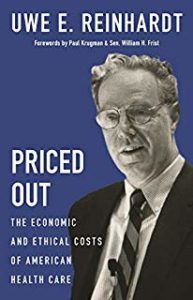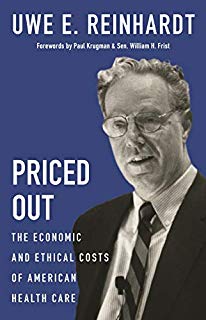
Uwe Reinhardt was a well-known health economist at Princeton University who died in 2017. An outspoken advocate of government regulation of health insurance, he helped design the single-payer system adopted by Taiwan’s government.
Reinhardt’s last book is Priced Out: The Economic and Ethical Costs of American Health Care. In it, he argues that U.S. health care is too expensive, its administrative costs are too high, the U.S. tax system subsidizes health care for high-income people, and the government should increase the subsidy for health care for low-income people. He also expresses strong skepticism about requiring people to pay more out of pocket for their own health care, claiming it will not push consumers to price-shop for care.
Unfortunately, in the book Reinhardt biases his comparison of drug prices across countries and says nothing about the U.S. Food and Drug Administration’s role in causing high drug prices. In claiming that people won’t price-shop when their incentives are changed by higher deductibles, he uses one company’s experiment to generalize to the whole country. Yet he himself, with his advocacy of reference pricing, argues that people who have to pay out of pocket will price shop. In discussing the tax treatment of employer-provided health insurance, he likens taking advantage of the tax break to feeding at the public trough. An immigrant himself—first from Germany to Canada, and then from Canada to the United States—Reinhardt criticizes the hiring of immigrant doctors. One refreshing proposal, though, is his idea for letting people avoid the Affordable Care Act (ACA) and take responsibility for their own health insurance.
This is from David R. Henderson, “Reinhardt’s Last Book,” Regulation, Summer 2019. (Scroll down just past half-way.)
Some other highlights follow.
Reinhardt’s view on immigration of doctors
His language on another issue, immigration of doctors, is also disturbing. In the aforementioned C-SPAN interview, he stated that when doctors trained in other countries move to the United States, we are “robbing them of their physicians.” We’re not. When Reinhardt and I moved to the United States from Canada, the United States did not “rob” Canada of budding economists; we immigrated. The case with doctors is no different.
Is food less important than health care?
In her epilogue, [Tsung-Mei] Cheng points out that when Reinhardt was a child in Germany, he and his siblings had health care through the “social insurance” system that Chancellor Otto von Bismarck established back in 1883. She comments, “Germans may not always have had enough food in those years, but all had the health care they needed.” That comment is telling. There are tradeoffs. Would you rather spend a dollar on health care or on food, and who should get to choose? Cheng’s comment implies, and presumably her husband would have agreed, that it should be the government’s choice and the government should choose health care over food. Why that’s so is unclear. Elsewhere in the book, Reinhardt notes that health care contributes “no more than 10 percent to 20 percent of observed cross-country variations” in health status measures. For some people, especially poor people, food could easily be more important than health care.
A Reinhardt policy proposal that I like
I’ll end with a Reinhardt policy idea I like, about how government should deal with a perverse incentive that the ACA creates. The ACA requires insurers that sell individual health insurance policies to practice community rating. “Community rating” means that insurance companies charge the same premium to healthy people that they charge to unhealthy people. The result, he notes, is that a high percentage of healthy people will game the system, refraining from buying insurance until they are sick.
The usual solution that health policy analysts advocate for this is to require the uninsured to wait months or years before they can buy community-rated insurance. Reinhardt takes this idea a step further. He would require all American residents, at age 26, to buy community-rated insurance. If they refuse, they would not be allowed to buy community-rated insurance at any time in the future. They would instead go uninsured or buy insurance priced according to risk.
As long as government would not regulate the items that individual insurance would cover, this strikes me as a good proposal. I could imagine young people saving a few thousand dollars a year and then, when they get sick at, say, age 50, having tens of thousands of dollars to spend on health care. I could also imagine them doing what my daughter did before the ACA prohibited it: buy risk-priced health insurance with guaranteed renewability. That would be a large improvement on the current system.
I have one little regret. I read a few years ago that Uwe would be out in Monterey to give a talk at the Community Hospital of the Monterey Peninsula. (We locals call it CHOMP.) I emailed him to see if I could take him for coffee when he was here. He said yes but, unfortunately, cancelled just before the event. I would have liked to discuss these issues with him.


READER COMMENTS
Thaomas
Jun 22 2019 at 9:36am
There are lots of ways to equalize the subsidy for health insurance between employer-provided and individually purchased insurance. ACA was a movement in that direction, but it could have done much better.
Comments are closed.